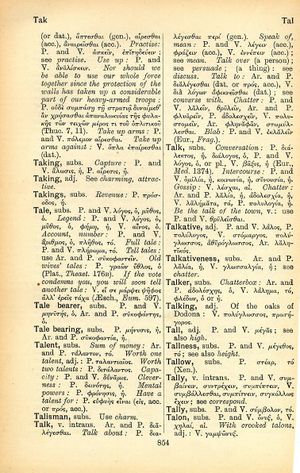tale: Difference between revisions
From LSJ
ῥᾴδιον φθείρειν φαρμακεύσεσιν ἢ ἀποτροπαῖς ἢ καὶ κλοπαῖς → easy to spoil by means of sorcery or diverting or theft
(CSV5) |
m (Text replacement - "<b class="b2">Eum.</b>" to "''Eum.''") |
||
| Line 14: | Line 14: | ||
<b class="b2">Old wives' tales</b>: P. γραῶν [[ὕθλος]], ὁ (Plat., ''Theaet.'' 176B). | <b class="b2">Old wives' tales</b>: P. γραῶν [[ὕθλος]], ὁ (Plat., ''Theaet.'' 176B). | ||
<b class="b2">If the vote condemns you, you will soon tell another tale</b>: V. εἴ σε μάρψει [[ψῆφος]] ἄλλʼ ἐρεῖς [[τάχα]] (Aesch., | <b class="b2">If the vote condemns you, you will soon tell another tale</b>: V. εἴ σε μάρψει [[ψῆφος]] ἄλλʼ ἐρεῖς [[τάχα]] (Aesch., ''Eum.'' 597). | ||
}} | }} | ||
Revision as of 11:57, 7 August 2017
English > Greek (Woodhouse)
subs.
Legend: P. and V. λόγος, ὁ, μῦθος, ὁ, φήμη, ἡ, V. αἶνος, ὁ.
Account, number: P. and V. ἄριθμος, ὁ, πλῆθος, τό.
Full tale: P. and V. πλήρωμα, τό.
Tell tales: use Ar. and P. συκοφαντεῖν.
Old wives' tales: P. γραῶν ὕθλος, ὁ (Plat., Theaet. 176B).
If the vote condemns you, you will soon tell another tale: V. εἴ σε μάρψει ψῆφος ἄλλʼ ἐρεῖς τάχα (Aesch., Eum. 597).

